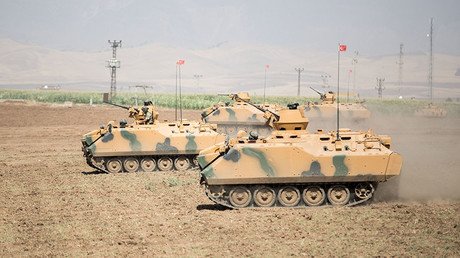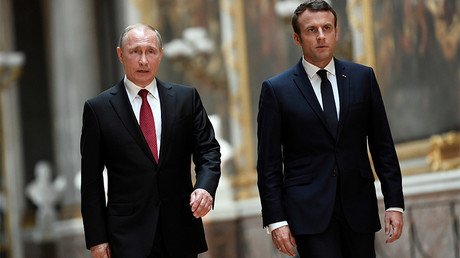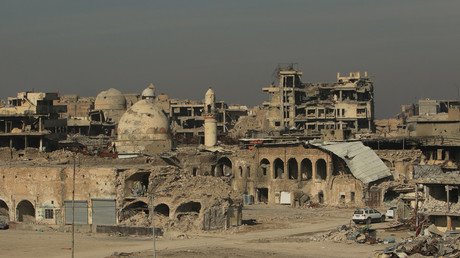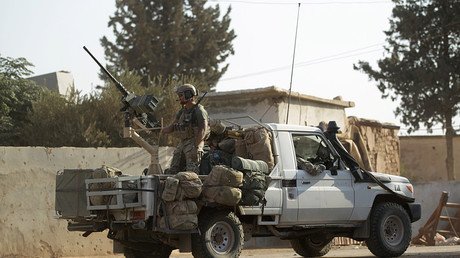French support of Syrian Kurds 'a bow to the US, not change of guard,' say analysts
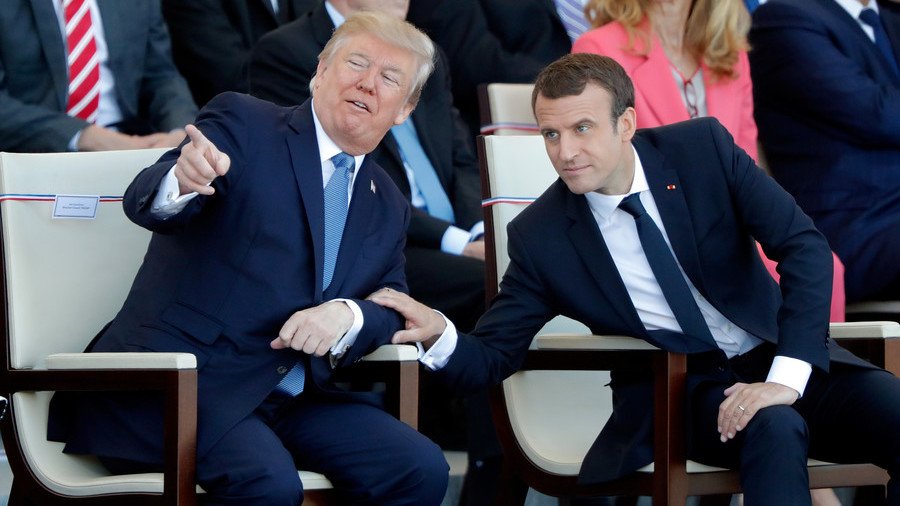
Paris voiced its support for Kurdish militias just as Trump announced that the US would soon be leaving "someone else" to deal with Syria. This suggests no change to Western military presence in the region, analysts told RT.
This week, French President Emmanuel Macron met a delegation from Turkey, which included Kurdish representatives – both from the YPG militias and their political arm, the PYD. The YPG is the dominant part in the Arab-Kurdish Syrian Democratic Force (SDF), which provided ground troops for the US-led coalition during the siege of Raqqa, the former stronghold of the terrorist group Islamic State (IS, formerly ISIS).
Macron pledged continued support for the SDF, while the Kurds said France would deploy additional troops in Syria. There are already French special forces in the country, working as military advisers and intelligence officers. But the several hundred troops and their level of operational engagement are relatively modest compared to the estimated 2,000 US military personnel stationed in Syria.
Just as Macron received the delegation, US President Donald Trump announced that American troops may soon be called back from Syria, allowing other players to deal with problems there. The statement was later downplayed by both the Pentagon and the State Department, and was apparently unscripted – unlike Macron's expression of support.
Ankara was angered by the French declaration of support for the Kurds. The Turks perceive Kurdish militias in Syria as nothing more than an extension of its domestic Kurdish insurgency, the PKK, and thus a legitimate target for military action. In January, regular Turkish troops and pro-Turkish militias launched a cross-border operation targeting the Kurdish enclave of Afrin in northwestern Syria. Ankara officials repeatedly threatened to go east towards Manbij, the operational base of the US troops, and possibly further towards the Iraqi border.
"Those who hang out with terrorists and even host them in their palaces will realize their mistakes sooner or later. What we go through can happen to them anytime, too," President Recep Tayyip Erdogan said about Macron's move.
In light of Ankara's anger, the Elysee Palace distanced itself from statements by the Kurds, explaining that French involvement in northern Syria would not extend beyond anti-IS operations. The underwhelming follow-up to the initial words of strong support is hardly unexpected, considering France's actual capabilities and relations with the United States, analysts told RT.
The support for the Kurds by Macron is mostly limited to public statements, as are some other elements of his Syrian politics, said Grigory Lukyanov, a Middle East analyst and senior lecturer at the Higher School of Economics in Moscow. For example, two weeks ago, Paris followed Washington's lead by threatening Damascus with airstrikes over the alleged use of chemical weapons by pro-government troops. Accusations of chemical attacks continued, but no airstrikes followed, Lukyanov noted.
‘We will be out of Syria very soon!’ - DONALD TRUMP pic.twitter.com/dm0424jfQr
— RT (@RT_com) March 31, 2018
"The French statements are aimed at calling on Turkey to follow NATO discipline as well as draw attention from the US, win their support on other directions," he said.
"The French leadership apparently sees a problem in the Middle East, and that is a problem that the US has. France needs US support on a number of issues, but there are just a handful of issues with which it can offer help to the US. The Syrian issue is perceived as one of those. The French rhetoric, they believe, may make Turkey more malleable vis-a-vis the US," he added.
In the Middle East, France has been a "second-tier player" for six decades and that will not change, Lukyanov added. Paris' core interests traditionally lie in North Africa's Sahel region, where it has both military presence and political influence. Under Macron, Paris also became more involved in Libya.
"Macron considers Libya as having potential in terms of helping him built an image of a regional peacemaker and making France an efficient mediator in regional conflict. This policy to some extent ignores the interests of other nations, including the US," he explained.
The French have indeed little to offer the Kurds directly, agreed Ruslan Mamedov, a Middle East analyst from the Russian International Affairs Council, a Moscow-based think-tank. They have neither the capabilities nor the experience in regional affairs that the Americans do. But Macron has some cards in his hand to play in terms of international diplomacy.
"Macron has something that the Americans don't. He has a grain of pragmatism and an absence of a track record of calls for [Syrian President Bashar] Assad to step down," Mamedov told RT. That gives him potential to negotiate with Russia on what the future of Syria should look like, the analyst said.
Russia's position may be important, for instance, for the future of Manbij, which, Mamedov believes, the Kurdish militias will have to give up sooner or later. "It's a predominantly Arab town and Kurds are not welcomed there. A Kurdish government in that city is nonsense. The town is likely to go to Arab control, be it one answering to Damascus or to Turkey," he explained.
There is a historic animosity between the Kurds and the Arabs, with grudges stretching back decades. The empowerment of Kurds in Iraq and Syria placed them in a position that allows them to seek retribution for oppression in the past. SDF unity may be seriously undermined if Arabs feel like their interests are being ignored.
"There were some instances of Arab tribes living in the territory under the control of the SDF and the Americans rising against them. This may become a major factor," the analyst said. "If the US-backed governing structure is undermined from within, the Americans may simply be pushed out by combined pressure from inside and from the outside."
Think your friends would be interested? Share this story!
